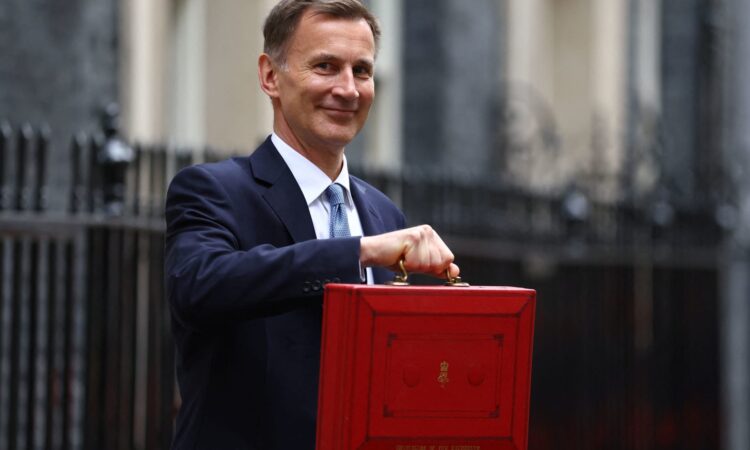
Sterling inches up slightly against the dollar
The pound was slightly higher against the dollar at the close of the U.K.’s Spring Budget announcements.
Sterling was seen trading up 0.13% against the greenback at $1.2720 by 1:40 p.m. London time. It was down 0.13% against the euro at 1.16.
— Karen Gilchrist
High income child benefit threshold to rise to £60,000
The government will increase the threshold at which parents start paying the high income child benefit charge from £50,000 to £60,000.
Hunt claims this will make almost half a million families better off by an average of almost £1,300 per household.
Hunt confirms 2 pence cut in National Insurance cut from 10% to 8%
Hunt confirms that National Insurance, a tax on payrolled workers, will be cut by 2 pence from 10% to 8%, furthering the previous cut in November from 12% to 10%.
“It means an additional £450 for the average employee,” he adds.
Self-employed NI will be cut from 8% to 6%.
The OBR estimates that when combined with the Autumn reduction, the NI cuts will mean the equivalent of 200,000 more people in work, adding 0.4% to GDP and 0.4% to GDP per capita, Hunt says.
“That means the average earner in the U.K. now has the lowest effective tax rate since 1975,” Hunt claims.
“Their effective taxes are now lower than in America, France, Germany or any G7 country, because Conservatives believe that making work pay is of the most fundamental importance.”
He vows to continue to cut National Insurance whenever the Treasury has the fiscal room to do so.
Hunt: Government will abolish ‘non-dom’ tax status
Hunt announces that the government will abolish the non-domiciled tax status, implementing a long-standing policy priority for the main opposition Labour Party.
Non-dom status enables someone who lives in the U.K. but is not settled in the country permanently to only pay U.K. tax on money made in the country, and to avoid paying it on foreign income.
The non-dom regime will be replaced with a “fairer, residency-based system” from April 2025, Hunt says, raising £2.7 billion in tax revenue by the end of the forecast period.
There will be a similar status open to people migrating to the U.K. for the first four years, however, after which they will have to pay tax in the country.
Hunt promises to use the additional tax revenue to “cut taxes on working families” rather than spend on public services.
Hunt extends energy windfall tax until 2029
“Because the increase in energy prices caused by the Ukraine war is expected to last longer, so too will the sector’s windfall profits, so I will extend the sunset on the energy profits levy for an additional year to 2029, raising £1.9 billion,” Hunt says.
Hunt announces new tax on vaping, one-off rise in tobacco duty, rise in air passenger tax
Hunt announces a new tax on vapes and says there will be a one-off increase to tobacco duties, along with an increase in tax on business class flights.
Hunt announces £3.4 billion investment in NHS productivity
Hunt says the government will invest £3.4 billion to modernize IT systems in the National Health Service, unlocking £35 billion of savings.
This means NHS spending has increased by 13% in real terms since the start of this Parliament in 2019, he says.
Take fall in government debt ‘with a pinch of salt’: IFS
Independent economic think tank the Institute for Fiscal Studies said forecasts outlining a fall in government borrowing should be taken “with a pinch of salt.”
IFS director Paul Johnson said in a social media post that the forecasts “will depend on implementing extremely tight spending plans which will imply cuts for many public services.”
During his Spring Budget, U.K. Finance Minister Jeremy Hunt said economic forecasts from the Office for Budget Responsibility showed government debt was set to fall over the coming years. He added that, by the end of the decade, borrowing for public services was set to hit its lowest level since 2001.
— Karen Gilchrist
Hunt says he will maintain plan for 1% increase in public spending
Hunt says he will maintain the government’s plans to increase public spending by 1% in real terms, as set out in the Autumn Statement, but vows to “spend it better.”
He announces a new public sector productivity plan that “restarts public service reform and changes the Treasury’s traditional approach to public spending.”
Hunt: Government will sell remaining stake in NatWest bank this summer
A sign outside a NatWest Group Plc bank branch in the City of London, UK, on Tuesday, July 25, 2023. Natwest is due to report first-half results on Friday, July 28. Photographer: Hollie Adams/Bloomberg via Getty Images
Bloomberg | Bloomberg | Getty Images
Jeremy Hunt says the government will privatize its remaining stake of around 31% in NatWest this summer at the earliest, with a sale to retail investors.
The government purchased the stake in 2008 in order to rescue the Royal Bank of Scotland during the Great Financial Crisis.
Hunt: AstraZeneca to invest £650 million in the UK
Hunt notes that AstraZeneca today announced a £650 million investment into the U.K., to expand its footprint on the Cambridge Biomedical campus and a manufacturing hub in Liverpool.
He says the government will also provide an additional £45 million for medical research, including into cancer, dementia and epilepsy.
The AstraZeneca logo.
Nurphoto | Getty Images
Hunt will spend £200 million to extend the recovery loan program
Hunt promises £200 million to extend the recovery loan program and increase the VAT (sales tax levy) registration threshold from £85,000 to £90,000, bringing many small businesses out of paying VAT.
Hunt announces new ‘British ISA’ to drive UK stock investment
Hunt claims the U.K. is on track to become the next Silicon Valley, and the government will introduce a new “British ISA,” allowing investments of up to £5,000 in British companies.
An ISA (individual savings account) is a popular savings account in the U.K. that offers tax-free interest payments.
The government has already announced plans to make pension funds disclose how much they are investing in the U.K. versus overseas markets.
Watch back: UK government borrowing to fall over coming years, OBR says
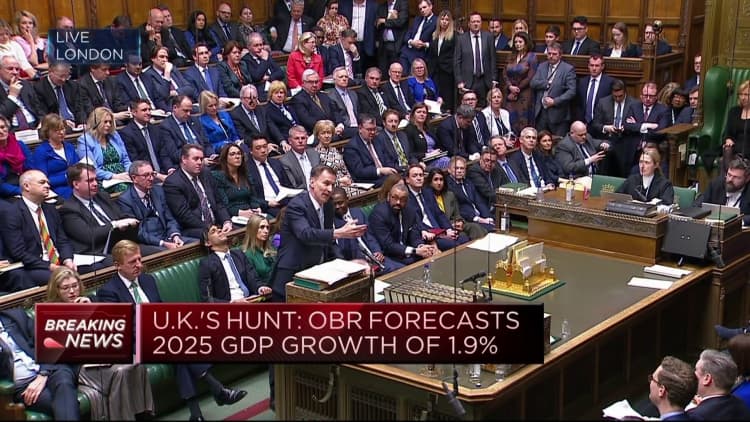
U.K. Finance Minister Jeremy Hunt said government borrowing is set to fall over the coming years as he outlined economic forecasts from the Office for Budget Responsibility (OBR).
Hunt also said that the government was expected to meet its target to reduce public sector borrowing to 3% of gross domestic product (GDP) three years ahead of schedule.
“There is nothing compassionate about running out of money,” Hunt said.
— Karen Gilchrist
OBR forecasts 0.8% growth this year
The OBR expects GDP to grow at 0.8% this year and 1.9% next year, higher than previously expected.
After that, growth rises to 2.2%, 1.8% and 1.7% in 2028/9.
OBR: Debt will fall to 94% of GDP by 2028/29
Hunt says the OBR now forecasts that debt as a percentage of GDP will fall in each year of the forecast horizon to 94% in 2028/29, having previously projected that it would rise to exceed 100%.
Underlying debt, which excludes Bank of England debt, will be 91.7% in 2024/5, 92.8% in 2025/6, then 93.2% for the next two years before falling to 92.9% in 2028/29.
“Our underlying debt is therefore on track to fall as a percentage of GDP, meeting our fiscal rule, and we continue to have the second-lowest level of government debt in the G7,” Hunt says.
Public sector borrowing is expected to fall from 4.2% of GDP in 2023/4 to 1.2% in 2028/9.
“By the end of the forecast, borrowing is at its lowest level of GDP since 2001,” Hunt adds.
Hunt will maintain the 5 pence cut to fuel duty and extend freeze for 12 months
Hunt says he will maintain the “temporary” 5 pence cut to fuel duty and extend the freeze in the tax for another 12 months, which he says will save the average car driver £50 next year.
“Taken together with the alcohol duty freeze, this decision also reduces headline inflation by 0.2 percentage points in 2024/5, allowing us to make faster progress towards the Bank of England’s 2% target,” he adds.
Hunt extends alcohol duty freeze until Feb. 2025
Hunt announces that the freeze on alcohol duty will be extended until February 2025, benefiting 38,000 pubs across the U.K.
Hunt abolishes £90 charge for debt relief orders
Hunt abolishes the £90 charge for a debt relief order and will increase the repayment program for people taking advance loans from 12 months to 24 months.
OBR forecasts inflation will fall below 2% in a few months
The independent Office for Budget Responsibility (OBR) forecasts that inflation will fall below the Bank of England‘s 2% target in a few months’ time, a year earlier than forecast in the Autumn Statement, Hunt reveals.
The latest figures show the headline annual consumer price index at 4% in January.
Hunt: We can now help families with permanent cuts in taxation
Hunt says the government is now in a position to “help families with permanent cuts in taxation” and plans to stimulate economic growth to lead to a “high wage, high skill economy.”
Hunt steps up to the despatch box
Jeremy Hunt is up, and starts his address by announcing £1 million to build a memorial for Muslims who died during the two World Wars.
A word from CNBC’s reporter on the ground, Silvia Amaro
LONDON – March 6, 2024: CNBC’s Silvia Amaro interviews Chris Hayward, policy chairman at the City of London Corporation, outside the Houses of Parliament ahead of the U.K.’s Spring Budget statement.
Emilia Hardie, CNBC
CNBC General Assignments Reporter Silvia Amaro has been outside Westminster since the early hours, talking to economists about what to expect from the chancellor:
“The pressure is on. Chancellor Jeremy Hunt is gearing up to present the final Spring Budget of this government before voters head to the polls later this year. No doubt the upcoming general election will impact today’s budgetary announcements.
“The open question is how far the chancellor will be willing to go to convince voters and whether that will be enough to make a big difference in the voting intentions. The Conservative Party is significantly behind Labour, by about 20 percentage points. Though it is still unclear when the general election will take place this year, everyone in Westminster knows: the clock is ticking!”
UK stocks nudge higher on ‘British ISA’ speculation
Britain’s FTSE 100 led the way among major European stock indexes on Wednesday morning, nudging 0.3% higher.
Russ Mould, investment director at AJ Bell, suggested the cautiously positive sentiment may derive from speculation that Jeremy Hunt will announce plans for a “British ISA” in order to encourage more Brits to invest savings in U.K. stocks.
An ISA (individual savings account) is a popular savings account in the U.K. that offers tax-free interest payments.
The government has already announced plans to make pension funds disclose how much they are investing in the U.K. versus overseas markets.
“In theory, that could provide a tailwind for UK equities if a significant number of investors invest extra money in UK stocks, pushing up prices,” Mould said in an email Wednesday.
“This is all theoretical and there is no guarantee it will play out in this way if the British ISA goes ahead. In reality, people can already invest as much as they like in U.K. shares via a stocks and shares ISA, so any benefit for UK companies is likely to be relatively marginal.”
However, he noted that both the FTSE 100 and FTSE 250 outperformed developed market peers on Wednesday, perhaps on hopes that the British ISA could in theory make the U.K. a more attractive listing venue for companies looking to go public.
London has also suffered a number of de-listings and high-profile IPO snubs over the past year, with British semiconductor design firm Arm notably opting to list on New York’s Nasdaq.
— Elliot Smith
Must look at tax cuts in the context of past and future increases, think tank says
When the government announced in November that it was cutting the rate of National Insurance from 12% to 10%, economists were quick to point out that most taxpayers would still be worse off due to the effect of existing freezes on personal tax thresholds — known as the “fiscal drag.”
Freezing the tax thresholds, rather than increasing them in line with inflation, means that, as nominal wages rise, millions more people are tipped into higher tax brackets, or into the tax system after previously being below the required income level.
The Resolution Foundation, a think tank focused on improving living standards for low and middle-income families, highlighted that the expected further 2 pence cut to NI on Wednesday should be seen as the filling of a sandwich between past and future increases in the personal tax burden.
“These tax cuts that are likely to happen today come in the context of tax rises that have already happened — about £20 billion worth that have already happened — so that’s largely in the form of freezing the thresholds at which people actually start to pay tax on their income,” Senior Economist Hannah Slaughter told CNBC’s Silvia Amaro on Wednesday.
“Those thresholds would normally go up with inflation, so more people than would otherwise have been the case are actually paying taxes or paying higher rates of tax.”
On top of that, Slaughter highlighted that a slew of future tax rises are penciled in to take place after the impending election.
“We’re expecting further threshold freezes — obviously all of this is dependent on who wins the election on what they decide to do — but about £17 billion of tax rises have already been announced for after the election, so that’s how we should be thinking about the cuts today in the wider context of tax rises ahead and in the past,” Slaughter said.
– Elliot Smith
Nomura: Expect a combination of cost cutting and borrowing to fund tax pledges
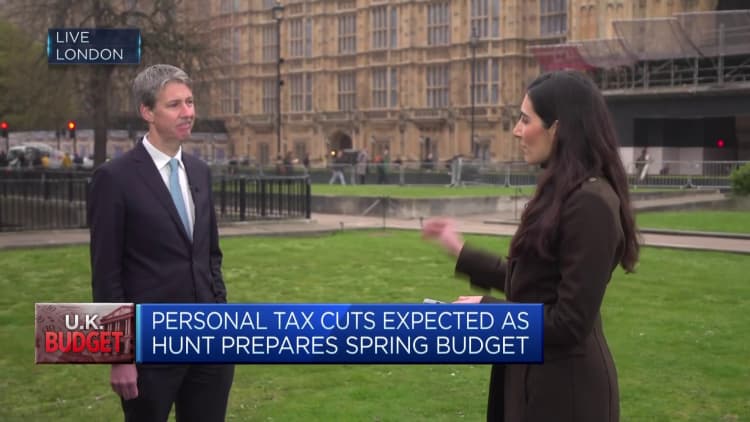
George Buckley, chief European economist at Nomura, told CNBC outside Parliament on Wednesday that the big question when discussing loosening fiscal policy in the form of tax cuts is “where is that money coming from?”
“Is it going to be borrowed, or are they going to try and bring in tightening elsewhere to offset that? I think it probably will be a combination of both,” he told CNBC’s Silvia Amaro.
He noted that the government has received a boost from improved public finances, lower interest rates and lower inflation, all of which reduce the Treasury’s outgoings — but said Hunt still has very limited room to maneuver.
“With policies like cutting National Insurance costing £10 billion, and that’s just one policy, there’s going to be a lot of other things that they need to do to reduce the deficit,” Buckley said.
– Elliot Smith
UK stocks slightly higher, sterling muted in early trade
City of London Corporation: Need to stimulate high-growth British startups
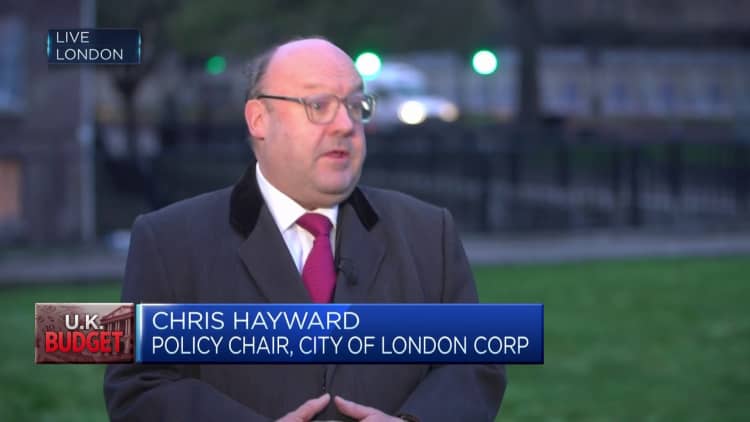
Chris Hayward, policy chairman of the City of London Corporation, tells CNBC that he would like to see measures aimed at backing burgeoning British businesses to scale up in the U.K., in order to drag the country out of a period of economic stagnation.
The organization represents the interests of the historic center of London that hosts much of the U.K.’s financial sector.
– Elliot Smith
Poll: Sunak’s Conservative Party faces historic election wipeout
Prime Minister Rishi Sunak leaves Dorland House in London after giving evidence to the UK Covid-19 Inquiry during its second investigation exploring core UK decision-making and political governance.
Jordan Pettitt | Pa Images | Getty Images
The latest national poll by Ipsos, published Monday and taken from Feb. 21 to 28, gives Prime Minister Rishi Sunak’s ruling Conservative Party a vote share of 20%, its lowest ever recorded since the market research company’s Political Monitor series began in 1978.
The poll suggests the main opposition Labour Party is on course for a landslide victory with 47% of the national vote, while the centrist Liberal Democrats are expected to pick up 9%. The Green Party and the hard-right Reform U.K. are each on course for 8%.
If these numbers played out nationally, Labour would end up with an enormous majority of more than 400 seats, according the Electoral Calculus.
Sunak’s job performance rating also reached the lowest point of his premiership, with only 19% of respondents satisfied with his performance as prime minister and and 73% dissatisfied, for a net rating of -54.
Labour leader Keir Starmer’s ratings also fell since January, with a net score of -26, only slightly above his lowest reading of -29 in May 2021.
However, voters see Labour as having the best policies across most key issues, including the economy, taxation, work, public services and public spending.
– Elliot Smith
Hunt expected to announce 2 pence cut to National Insurance, reports say
Multiple British media outlets reported Tuesday that Hunt is expected to announce a 2 pence cut to National Insurance.
The U.K. National Insurance is a tax on workers’ income and employers’ profits to pay for state social security benefits, including the state pension.
The Treasury confirmed that the government will use its fiscal headroom to “help families with permanent cuts in taxation.”
The reported plans match the previous cut announced in Hunt’s Autumn Statement, which cut the NI rate from 12% to 10%.
Though touted at the time by the Conservative Party as the “largest ever tax cut for workers,” opposition parties and many economists were quick to point out that its benefit to payers would be wiped out by the effect of existing freezes on personal tax thresholds — known as the “fiscal drag.”
– Elliot Smith
Berenberg: Tax cuts unlikely to help economic recovery, or Conservatives’ electoral hopes
LONDON – March 15, 2023: Tens of thousand of striking teachers are joined by workers from other striking trade unions as they march from Hyde Park towards Trafalgar square on the day of Finance Minister Jeremy Hunt’s Spring Budget announcement.
Guy Smallman/Getty images
Wednesday will be the government’s last chance to influence the economy before a general election at some point later this year.
But with limited fiscal headroom, Berenberg Senior Economist Kallum Pickering doubts modest tax cuts can materially help the Conservatives close the massive poll gap to the main opposition Labour Party, which appears on course for an historic landslide.
“First, the government simply does not have the fiscal headroom to give the economy a big shot in the arm,” Pickering said in a note Tuesday.
“Second, as power is likely to shift to Labour later this year, at best, tomorrow’s announcements may be valid for between six to nine months before the five-year plans are torn up and rewritten by the next (likely Labour) chancellor.”
The independent Office for Budget Responsibility in November estimated that the government had around £13 billion of headroom against its primary fiscal target, which is for public sector net debt to fall in the final year of its five-year forecast horizon.
Between April and January, government borrowing has thus far come in £9.2 billion below the OBR’s November forecast, but the extent of Hunt’s fiscal headroom will depend on a new set of OBR projections published Wednesday.
“While likely modest downgrades to economic growth will hurt projected public finances, stronger population growth and a lower profile for interest rates will provide a boost,” Pickering said.
“As a best guess, Hunt probably has wiggle room of around £20bn-25bn, which is below the £29.7bn of GDP-adjusted room that past chancellors have aimed for since the OBR was established in 2010. To retain credibility, Hunt will need to leave at least some headroom.”
– Elliot Smith
Hunt: ‘We can now help families with permanent cuts in taxation’
The Treasury said late Tuesday night that Hunt will set out a “budget for long-term growth” through measures designed to build a “high wage, high skill economy.”
“Of course, interest rates remain high as we bring down inflation. But because of the progress we’ve made because we are delivering on the Prime Minister’s economic priorities we can now help families with permanent cuts in taxation,” Hunt is expected to say in Wednesday’s Budget statement.
The chancellor is also expected to reiterate the government’s message on fiscal responsibility, with some economists expecting targeted cuts to public spending.
“When it comes to borrowing, some believe there is a choice between responsibility and compassion. They are wrong,” Hunt is set to say.
“With the pandemic behind us, we must once again be responsible and increase our resilience to future shocks. That means bringing down borrowing so we can start to reduce our debt.”
– Elliot Smith
Here’s what the government has already announced
As ever, the weekend before a big fiscal statement was peppered with teasers of what to expect on Wednesday.
The Treasury pre-announced plans over the weekend to deliver up to £1.8 billion ($2.3 billion) worth of benefits by boosting public sector productivity, including releasing police time for more frontline work.
The Independent Office for Budget Responsibility estimates that returning to levels of pre-pandemic productivity could save the Treasury up to £20 billion per year.
Hunt will also announce £360 million in funding to boost research and development (R&D) and manufacturing projects across the life sciences, automotive and aerospace sectors, the Treasury said Monday.
This will include £92 million in joint government and industry investment to “expand facilities to manufacture life-saving medicines and diagnostics products,” £200 million joint investment in zero-carbon aircraft technology and almost £73 million in automotive technology.
Pension funds will now be required to publicly disclose how much they invest in U.K. businesses versus those overseas, and poor performing projects will not be allowed to take on new business from employers.
– Elliot Smith
‘Unity of understanding’ between Reeves and Hunt on fiscal rules, former Labour MP Umunna says
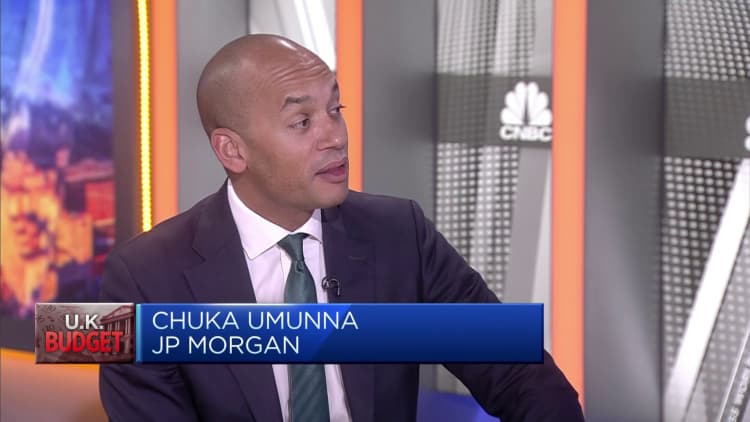
Chuka Umunna, head of EMEA ESG at JPMorgan and former U.K. Labour Party MP, discusses the upcoming General Election and the potential implications for fiscal policy.






